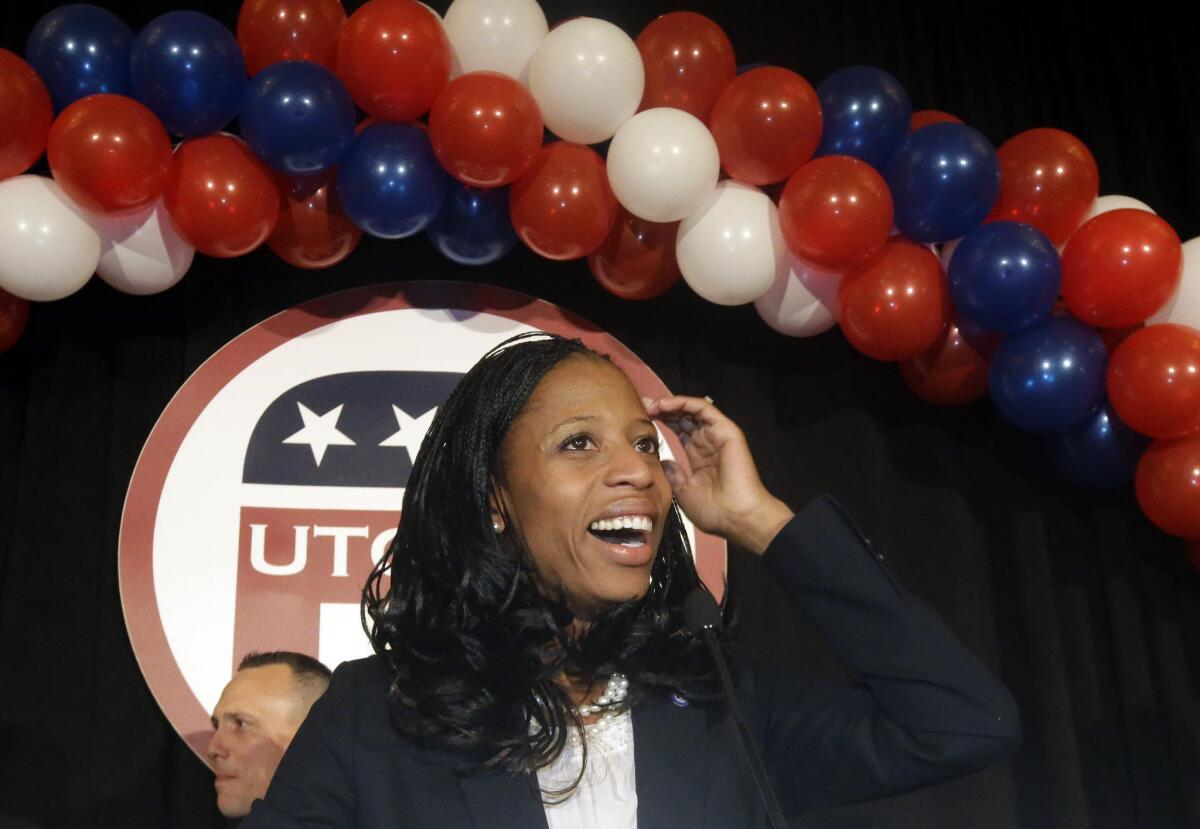GOP hopes Mia Love’s win a watershed moment for the party

- Share via
Reporting from Salt Lake City — She’s a whip-smart and opinionated anomaly, a newcomer to Washington of Haitian immigrant parents. She’s also, the Republican Party hopes, a harbinger of the future.
Late Tuesday night, in a narrow, hard-won victory celebrated by her supporters, including her teary-eyed parents, Mia Love became the first black Republican woman elected to Congress. After trailing her Democratic rival, Doug Owens, for most of the night, the 39-year-old Love pulled ahead in late results, winning a seat in the House of Representatives, 50% to 47%.
On Wednesday, the Salt Lake Tribune bannered the news: “Love Makes History.”
GOP strategists hope Love will help lure African American and immigrant voters from their traditional ranks — the Democratic Party. Their argument: She’s a new-generation voice who’s proud to be both a black woman and a fiscal conservative, not to mention a staunch critic of illegal immigration.
“She very well could be the new face of the Republican Party,” said Dave Hansen, Love’s campaign manager and a veteran of Utah politics.
He added: “But they are going to want to parade her around the country. She’s going to be a superstar in the sense that conservatives will be saying, ‘This is what the Republican Party should look like.’”
During her celebration speech Tuesday night, Love took a deep breath and acknowledged to supporters that they had beaten the odds.
“Many people said Utah would never elect a black, Republican, LDS woman to Congress. And guess what: We were the first to do it.”
African Americans represent just 1% of Utah’s population. But Love is also a no-nonsense, pro-gun, antiabortion conservative who criticizes government-subsidized student loans. In Utah, that’s a good fit.
In 2003, she was elected to the City Council in Saratoga Springs, becoming the first black woman to hold public office in that bedroom community of Salt Lake City. Six years later, she was elected mayor by capturing 60% of the vote, becoming the first black mayor in Utah.
Because Utah’s black population is so small, race wasn’t much of a factor in this year’s campaign, said Morgan Lyon Cotti, the state program manager of the Hinckley Institute of Politics at the University of Utah.
“Utah hasn’t dealt with a lot of issues that other states that have larger [black] populations have,” Lyon Cotti said, adding, “If anything, being in Utah might have made things easier for her.”
The 4th Congressional District is a ladle-shaped area that stretches from Salt Lake City’s southern suburbs past Provo, into a rural stretch of central Utah. The district’s median household income is $61,788 — above the national median of $53,046.
In 2012, Love challenged Democrat Jim Matheson, who is retiring this year, and lost by fewer than 800 votes. Lyon Cotti recalled a Republican strategist saying “he knew Mia Love was going to lose” back then because one week before the election — while Matheson was doing on-the-ground campaigning — Love was appearing on Fox News. This time around, Lyon Cotti said, she spent more time with voters and less time with the media.
Love’s path to the political spotlight starts out as an immigrant story. At age 5, she moved with her parents from Brooklyn, N.Y., to Norwalk, Conn., where her mother worked as a retirement home nurse and her father labored at such jobs as factory line worker and church janitor.
Speaking before the 2012 Republican National Convention, Love said that when her parents arrived in the U.S. from Haiti, they had “$10 in their pockets.” They didn’t look to Washington for help, she said, “they looked within.” As she is fond of saying, “I’m no victim.”
She attended the University of Hartford, where she took dance and singing and earned a degree in fine arts; she later worked as a flight attendant.
Her sister, Cynthia, joined the Church of Jesus Christ of Latter-day Saints and the family sent Mia out to investigate. She saw problems with the way the faith had treated blacks; until the late 1970s it had banned black men from the priesthood. But she also didn’t rule out a future role in the church.
Later, she met her future husband, Jason, while he was on a Mormon mission in Connecticut. They now have three children: Alessa, 14; Abigail, 11; and Peyton, 7. One scene from their early marriage encapsulates her pluck.
The newlyweds discovered they had received three identical toasters as wedding presents. Jason went to return two of them, while Mia waited in the car. He returned to say he was told he needed a receipt.
That fired her up. As Hansen tells it, she told her husband, “Don’t go in and ask them for what you want; go in and tell them what you expect.” She later walked in and got the refund, sans receipt.
“That’s going to be her approach in Washington,” Hansen said. “She’s going to go there and tell people what she expects.”
Up all night, reveling in her win, Love spent most of Wednesday catching up on her sleep.
The spotlight awaits.
Glionna reported from Salt Lake City and Pearce from Los Angeles.
Twitter: Follow @jglionna and @mattdepearce for national news.
More to Read
Get the L.A. Times Politics newsletter
Deeply reported insights into legislation, politics and policy from Sacramento, Washington and beyond. In your inbox twice per week.
You may occasionally receive promotional content from the Los Angeles Times.












